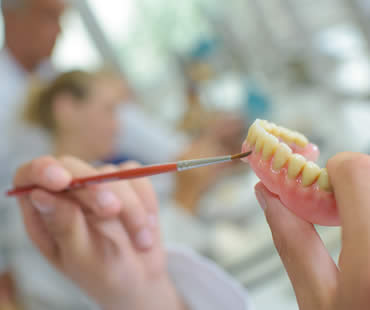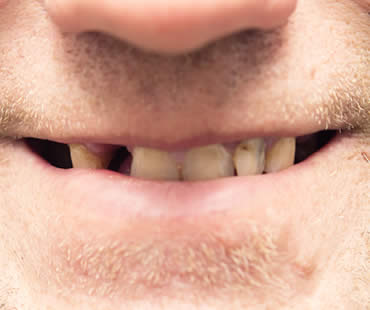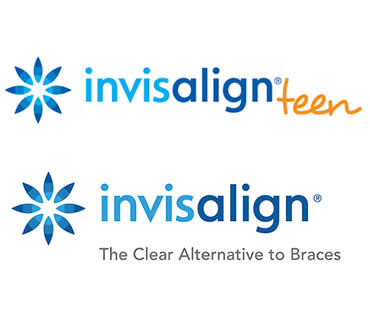
Thanks to advances in dental technology, dentures are more natural looking and comfortable than ever before. If you are one of the many adults wearing dentures to replace missing teeth, there are several do’s and don’ts you will want to follow to ensure they maintain their fit and your oral health:
- Do take your dentures out before going to bed, allowing your mouth tissues to rest from wearing them all day.
- Don’t let your dentures dry out. Soak them in mild denture solution or water while you sleep.
- Do clean them daily with either a mild detergent or special denture cleaning solution and a soft-bristled brush.
- Don’t soak them in very hot water, as this could cause them to warp, and they will no longer fit properly.
- Do handle them with care. Dropping your dentures or treating them with strong cleansers or harsh brushes can do permanent damage.
- Don’t neglect your oral care for the rest of your mouth. Even patients with a full set of dentures need to take care of their gums, and if you have partial dentures you should continue to brush and floss your remaining teeth regularly.
- Do pay attention to changes in the fit or feel of your dentures. Problems with fit can lead to irritation and discomfort, and could also be an indication of gum disease.
- Don’t try to adjust or repair your dentures on your own. If your dentures are ill-fitting or damaged in any way, schedule an appointment with your dentist to have them evaluated.
- Do continue to see your dentist for regular checkups to help maintain your best oral health and check your dentures for fit and function.
If you are missing all or some of your teeth, dentures can greatly improve both your appearance and the quality of your life. By following these simple guidelines, you can maintain the beauty and functionality of your dentures for many years.
If you live in the Meriden area contact us today

As we age, our birthdays tend to bring new oral health issues along with them. It’s a fact of life that our teeth and gums are impacted by our age. Here are some common problems to watch for, and suggestions for treatment.
Gum disease:
Regular dental checkups and cleanings are vital to avoid gum disease. The first stage is called gingivitis and it’s reversible. If untreated, it can lead to a very serious advanced stage called periodontitis. You may not experience signs of gum disease, so practicing good oral hygiene and seeing your dentist are the best ways to keep it at bay.
Tooth sensitivity:
If cold or hot foods cause you discomfort, you have a common problem called tooth sensitivity. It can result from decay, worn fillings, gum disease, broken teeth, or exposed roots. Your dentist may recommend toothpastes designed to reduce sensitivity, or other treatments based on the cause of your problem. Good oral hygiene can help with sensitivity also.
Missing teeth:
If you are missing any teeth, it not only looks unappealing but it can also affect your ability to eat and speak. Your other teeth may move, and bone loss can occur. Discuss treatment options with your dentist because you might be able to restore your smile. Bridges, implants, and dentures are a few of the dental advances that might help.
Dry mouth:
Medicines and some health conditions often cause your mouth to be overly dry. Having a dry mouth is uncomfortable, but it also can seriously impact your teeth and gums. Without saliva to naturally clean your mouth, the risks of tooth decay and other problems increase. Ask your dentist to look for signs of decay, and to help you identify the cause for your dry mouth. Be sure to tell your dentist about your medical history and medications.
Oral cancer:
Oral cancer can include your gums, lips, cheeks, tongue, jaw, throat, or soft palate. It sometimes begins with just a tiny spot or swollen area, so regular dental checkups can help catch this disease early. A variety of treatment options are available, but early detection makes a difference.
If you live in the Meriden area contact us today

Special occasions like class reunions and weddings where photos are going to be taken are important. You will want to look your best, especially when you look back on the photos in years to come. When you look in your mirror, are you noticing that your smile seems less than its best? Could your look use some refreshing?
As time passes, our smiles age. Whether you realize it or not, your teeth are discoloring a little bit every day. Discoloration can come from the food we consume, such as blueberries, beets, blackberries, balsamic vinegar or soy sauce. Drinking tea, red wine, coffee or dark soda can also affect the brightness of your smile. Smoking leaves teeth looking yellow and dingy.
As well as discoloring, our teeth slowly wear away. The outer, whiter layer of enamel will thin with age, revealing the yellower layer of dentin underneath. The length of a tooth is also reduced with age as teeth wear away with natural, everyday use. Short, discolored teeth send a signal of old age whether we intend them to or not.
Composite bonding, porcelain or composite resin veneers and dental crowns can help you achieve a brighter, whiter, more even smile. Veneers can even correct gaps and hide chipped or malformed teeth. Dental implants can be an excellent solution to a missing tooth. A smile that is badly misaligned might require braces or some other kind of orthodontia to achieve optimal results.
Your cosmetic dentist can work with you to determine what steps should be taken to address your particular smile concerns and rejuvenate your smile, making you look younger and more refreshed. You will begin to see the positive responses from people who will be able to see you at your youthful best, allowing you to be your most confident, most comfortable self. The changes you make now can change your smile for years to come.
If you live in the Meriden area contact us today

Modern technology is constantly making strides in improving dentistry, and the area of teeth straightening is no exception. In order to get your dream smile, you don’t have to be stuck with a mouth full of unsightly and uncomfortable metal braces any longer. Transforming your smile is now possible with a hidden product called Invisalign.
Also referred to as invisible braces, Invisalign utilizes clear plastic aligner trays to move your teeth into better positions. The series of customized trays are fitted for your mouth to gently move your teeth over time. Because they are created specifically for you, they are more comfortable than you might think and achieve their goal with minimal soreness. This is a great benefit over the painful and irritating process of traditional braces.
Wearing the clear aligners gradually shifts your teeth, and every few weeks your dental professional provides a new set of aligners to continue moving your teeth toward the final goal. This process is repeated until your teeth have moved into their desired positions, giving you a straight and attractive new smile. The aligners should be worn about 22 hours a day for best results.
Patients of all ages may be candidates for Invisalign. This technology is appealing to adults because it avoids the embarrassment of noticeable braces during professional and social encounters, and with teens who want to avoid the ridicule of a metal smile during an often emotional time of life. There is even a special version of Invisalign made for teens, which has a blue-dot display to remind the young adults about consistent wear and when it’s time to switch trays.
One of the other major benefits of Invisalign is that the trays are removable, making eating and hygiene easy. There are no diet restrictions like with traditional braces, and the cleaning hassles of metal brackets and wires does not exist.
If you are wanting to improve your smile with orthodontics, consider the revolutionary solution of Invisalign. It can keep you smiling throughout the entire process.
If you need a dentist in Meriden contact us today

Does your mouth feel like it’s full of cotton? Or does it remind you of the Sahara Desert? Having an overly dry mouth can result from a variety of dental and medical issues. For example, one common culprit of dry mouth symptoms is related to medications. The best long-term solution is to consult your dentist or physician to determine the root cause of your dry mouth, and to get treatment to solve the problem. Sometimes all that is needed is to change to a different medication, and your dry mouth will disappear. However, here are some things you can try to temporarily relieve your dry mouth until you are able to determine what is causing it.
- Sip water often.
- Limit caffeine consumption, which can dry out your mouth even more.
- Chew sugarless gum or suck on sugarless hard candy.
- Use an over-the-counter saliva substitute, such as Biotene.
- Do not use tobacco products of any kind.
- Do not use mouthwashes containing alcohol, because it can be drying.
- Avoid over-the-counter antihistamines and decongestants, which can worsen your dryness symptoms.
- Add moisture to the air using a humidifier.
- Try to breathe through your nose instead of your mouth.
If you do experience the symptoms of dry mouth, it’s especially important to protect your oral health. Make sure you brush your teeth with toothpaste containing fluoride, and ask your dentist if prescription fluoride toothpaste would benefit you. Use a fluoride mouth rinse before bed to add an extra layer of protection for your teeth. Limit the amount of sugary foods or items high in acids, as both of these types of foods increase your risk of tooth decay. Following these tips for relieving dry mouth symptoms can make it more comfortable for you to eat, swallow, and talk.
If you live in the Meriden area contact us today

If you’re unhappy with your smile, porcelain veneers might be a solution that you’re considering. These thin shells are placed over your teeth to make them whiter, straighter, and more appealing. Here are some facts that address some of the myths about porcelain veneers to help you make a better choice.
Myth: Large portions of your teeth must be removed when applying veneers.
Fact: Only a very small layer of your teeth needs to be removed so that veneers can be bonded onto them. The amount removed is usually as thin as a contact lens.
Myth: Porcelain veneers do not look natural.
Fact: When properly attached to your teeth, veneers become part of your mouth structure and are virtually indistinguishable from your real teeth. They also feel like your natural teeth.
Myth: Getting veneers is very painful.
Fact: Preparing your teeth for veneers is not painful because the dentist usually uses a topical anesthetic to relieve any discomfort. Having a model made of your mouth and then having the veneers bonded to your teeth are painless steps in the process. You might experience increased sensitivity to hot and cold foods initially after getting veneers, but that sensation dissipates within a few days.
Myth: Veneers are so expensive that only the rich can afford them.
Fact: Many dentists offer porcelain veneers, so the costs have decreased as popularity has increased. Dental veneers are not just for celebrities.
We look forward to seeing you in our Meriden dental office














